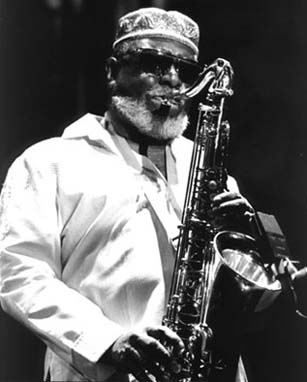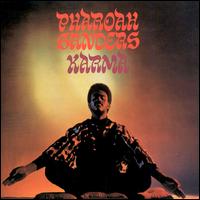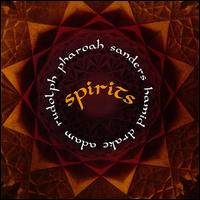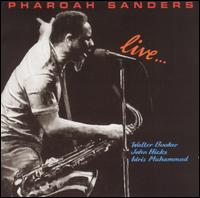

Courtesy of Pharoah Sanders

Impulse

Meta

Evidence
A FIRESIDE
CHAT WITH PHAROAH SANDERS
As
a preface, I have been a devotee of Pharoah Sanders (Ferrell Sanders)
since I first heard the now legendary John Coltrane recording, Meditations.
From Meditations, I came to the storied Ascension session and that furthered
my interest to Live in Japan (includes an almost hour long version of
"My Favorite Things"), for my two cents, the most unappreciated
and critically misunderstood album in Trane's discography. That spawned
my purchase of Sanders' Karma, which gave way to Black Unity. For a period,
Sanders was on Verve and recorded two sessions produced by the often maligned
Bill Laswell, Message from Home and Save Our Children. Kora superhero
Foday Musa Suso appears on Message from Home and Save Our Children still
makes its way into my CD player. That was a handful of years ago and apart
from a featured guest role here and a Catalina's concert there (although
Sanders did record Spirits for Adam Rudolph's label), Sanders remained
silent, out of the public eye, and more importantly, out of the public
ear. Void of a recording contract and having just played a mediocre week
at Catalina's, Sanders spoke about his absence and the pitfalls of falling
in the cracks of the preverbal American pop culture mantra, as always,
brought to you without commercial interruptions, unedited and in his own
words.
FRED JUNG: How is your health?
PHAROAH
SANDERS: I feel OK. I'm trying to keep up, keep my health together. So
far, I've had no problems.
FJ: I ask because when I saw you last week at Catalina's, you did a good
imitation of Miles Davis circa We Want Miles (1981), when much of the
playing was done by his band.
PHAROAH
SANDERS: That was maybe this week, but I had problems, my own reasons.
I am using another drummer. I am trying to check him out. I am trying
to check everybody out. I am trying to see if that is the kind of thing
that I really want to do. The drummer, that is the first time that I have
ever worked with him. He is a drummer that Billy Higgins really spent
a lot of time with. He has been playing since he was about two or three
years old, since he was a little baby. I thought I would try and use him.
I usually use Ralph Penland when I work down there. I just wanted to try
out somebody different. I am interested in doing some things with some
bigger companies, but nobody has really approached me. Verve had approached
me, but when they started laying off people.
FJ: This was pre-Tommy LiPuma.
PHAROAH
SANDERS: Oh, yeah. He don't want to have anything to do with me. He said
that somebody said that I don't like white people or something. I heard
that and I couldn't believe that. I don't know if somebody is trying to
do something to me. I don't know what it is. There is a lot of lies going
around.
FJ: Whoa, what kind of horseshit is that?
PHAROAH
SANDERS: I think somebody was trying to get a record session, a record
date and they had been playing for a number of years, a tenor player,
and he called me and told me that. I think the person at Verve now used
to be with GRP or something, but they send me things. He was very cool
and nice to me and we were talking about doing something. Later on, Verve,
Polygram, they were changing over and before he got in there, I was supposed
to be signing with Verve, a big contract, and never did happen because
they changed all the personnel. He felt like my music wouldn't go over.
I guess I played different stuff and it was not consistent as jazz or
whatever. I don't know if that was the problem or not and then I heard
this and somebody said that he said that he heard that I didn't like white
people. That made me feel so bad that I didn't feel like doing nothing
for a long time. Then I decided that maybe I should try to do something
on my own and then go to the big company. That might be where it is at.
FJ: Are you being passed over because you don't fit the mold? You are
admittedly reticent and in this age of hype and promos, you are not doing
yourself any favors.
PHAROAH
SANDERS: Their whole image or how they feel right now, because there are
some different kind of people up there now, that is why I would rather
do my own thing because I know what I want to do and I can do a little
by little until I get it to where I want it to be and then I will go to
them and if not, I will just sell it myself, little by little.
FJ: Ironic, since Impulse!, a Verve label, was built on the sessions you
did with Coltrane and you own bands.
PHAROAH
SANDERS: At that time, when I was making those albums, I was trying to
do both kinds of things, play in and out. I was working a little bit with
John Coltrane and at the same time, I always had my own band at the same
time. I was trying to work both bands and try to figure out what I wanted
to do. It kept me moving, but right now, I feel like I want to do some
other things, things that I haven't done like I haven't made an album
with all blues. There is a whole lot of things that I want to do. I am
not going to wait until a company calls me to do them. I will just go
ahead and do it and then deal with the big guys later.
FJ: Just a few years ago, you gave equal time to the soprano saxophone
and the tenor. I noticed lately, the soprano saxophone has disappeared
from your sessions.
PHAROAH
SANDERS: Well, I have had my problems with the soprano. I always felt
that I didn't have a good sound on my soprano and I was waiting, trying
to find a righteous mouthpiece that I could play that I really like. It
was a problem for me, playing soprano and then switching to tenor. Most
of the time, you find me playing soprano on albums and things and not
in person. So I had problems taking my instruments on the plane. I got
tired of them hassling me and so I stopped bringing my soprano. I just
bring my tenor. But now, I am thinking that maybe I should bring all of
them. I just need to get a case made for them to go underneath because
the plane gets full, it doesn't matter once you are on the plane. It is
not their fault. I just have to do something about it and I don't like
to make problems for me. I just need to find somebody to make me a case
that I can put up underneath. I just haven't got around to it. That is
all that is. I just haven't got around to getting somebody to make me
a metal case or something.
FJ: You have received your share of Coltrane questions.
PHAROAH
SANDERS: They always do. A lot of times, they don't know that we talked
just like anybody else. We'd ask how we were doing. It wasn't no big thing.
There wasn't anything concerning about the music. It was just general
conversation. He treated me just the way he treated anybody. I didn't
talk that much and John, he didn't talk that much.
FJ: I would have liked to be a fly on the wall for that conversation,
or lack there of.
PHAROAH
SANDERS: (Laughing) I would sit right next to him and not say a word and
wouldn't think about saying nothing and he would sit and never say anything
either. He was just one of those kind of people. He is very, very quite.
It seemed like when he picked up his horn, it was a whole different story
then. Then I would listen (laughing). I would definitely listen. I remember
one time, he gave me a rhythm thing to practice on and that was really
helpful to me. That was really telling me something, rather than just
what he had written down. The rhythm he gave me was something that we
were musically involved with and something he wanted me to do. When he
gave it to me, he just gave it to me. He didn't say nothing. He would
just do things. He never said nothing or explained nothing. He just would
do it and that was it. You were on your own. You had to be very independent
being around John. Then I started buying drumsticks and started working
on my rhythm a little bit more. Maybe he saw something in me and thought
that I should practice my rhythm instead of running around with my horn.
That is how I looked at it. Maybe he was trying to tell me something and
I better go and practice on my rhythm (laughing).
FJ: Have you lost the fire and brimstone in your playing from those days?
PHAROAH
SANDERS: I don't know. Sometimes, things get very unseen to the public.
You might see me working with the band right now, but I am working with
this band right now because I had to break up another band that I was
with because of personal problems. You just can't have that when you are
playing. You have to have guys that are straight. I may have lost a lot
by looking at it that way. Before, I think I had like John Hicks and Idris
(Muhammad) and some personal problem happened that don't have anything
to do with no music. I said that I was tired of it now and I have to find
somebody that is going to do it now and be on time for the gigs and don't
give me any problems. I don't want nobody on my gig drunk or doing some
other drugs or whatever it may be. I've been knowing William Henderson
for a long time, since 1959. I knew William before I met John Hicks. I
met William in Oakland, California. He is a very clean person, vegetarian
and all. I can really use that around me. I find that in California, I
can't find guys that have enough energy. They play a little bit and that's
about it. They play less. If I start a tune and then the pianist has to
solo, I am looking to everybody to get to a certain climate and then I
come back in while the energy is up high. Somehow that doesn't happen.
Since I have been working with these guys, it never has happened, so I
guess guys like to play their little solo and that is it and then the
next guy plays his solo and that is it. In New York, by me living there
so long, guys are into more energy. We play much longer and that makes
me want to play longer. If you build the intensity up to where I can come
in on that energy, that is what I want. Then you would see me playing
for a long time. If I have to do it all by myself, then it is not working
right. I look at it that the whole band is like one big solo. I like to
build. If nobody is building with me, then there is no sense in me trying
to play because that is not creative. You never get a lot of creativity
out of me because I am not pushed to do it. Nobody is looking at the energy.
They are all looking at the piece of music and this guy is soloing and
they already have it all figured out. I could play the whole set by myself
and I am giving them a chance to play and be heard and they don't take
advantage of that and do something with it, then it is not going anywhere.
That is why I am not getting enough work because I would like to work
all the time. Nobody really calls me. Ever since I have been playing,
I never worked every month. I will work this month and then I am off two
months. That is the way it has been going. I don't know why, but I guess
that is just the way it is.
FJ: How do you survive?
PHAROAH
SANDERS: I've been getting publishing royalties and stuff like that. I
have just been lucky. They come in at the right time. Sometimes they don't,
but I am not wealthy or anything like that. I just love to work. I would
rather work three hundred and something days out of the year. I would
rather be working. They don't know. I love playing. Then I can really
get my music together. If I don't do that, then my chops go down and stuff
goes down. If I can get some good musicians together and have a good rhythm
section, I can keep them working. Fred, I have a lot of problems out in
California trying to find drummers and bass players. The bass players,
they don't create. A lot of them I know, they just play a little solo.
I am not so used to that kind of playing. Drummers can't play on time.
Their time is bad. I just don't know what to do. Then when I go to New
York City, I find some good drummers or good bass players to work with.
I miss New York period and the musicians. Everybody around here is very
casual and very social, but no energy. I want somebody to come to the
gig and they are ready to hit. They are ready to play. Let's go and hit.
Energy and then would play one tune for the whole set. Music can get involved
where energy takes you to different places. You know that too. If I don't
go there, I don't really feel like I have given the people enough. I am
not a person who can get on the bandstand and play a million tunes for
a set. I want to play as long as I have my horn, a long, long time, where
one tune could be for the whole set. A lot of times, after a piano solo,
the bass player thinks he should solo and I feel like the drummer should
solo and the bass take the solo after the drummer and the bass can solo
and he can take us in another direction. I remember a bass player that
I used and he was always like this. He would take the band different places
and he is doing some other things and that is Stanley Clarke. He always
played and his energy would be so high that when he played his solo, he
would go on and do what he wanted to do and then he would start something
else. We would play one tune and after his solo, we would do some other
thing. It keeps on moving and I never got tired of that. I wish I could
get that back again. It is hard to try and tell a bass player to play
a little longer or get into some other rhythms or different times or something.
Make me do something.
FJ: Would life have been better for Pharoah Sanders if you remained in
New York?
PHAROAH
SANDERS: Well, I lived in New York in the Nineties. Well, if I went on
and signed a contract when they asked me to and I waited about a whole
year before I even thought about signing a contract. I should have went
on and signed it then before the new owner. That is my fault. The record
companies don't know you. They know of you, but they are more into pop.
I don't know. I think right now, I would rather do my own thing. I can
go ahead and finish it and then put it out there. If one company is not
interested, I can move on to another. I would like to make a record with
straight ahead things, some things that I wanted to do for a long time.
It would not be commercial. There would be some things that I felt I hadn't
finished from a long time ago. It is just a matter of finding the right
musicians. Most of the time, when you find the right musicians, they are
working with somebody else or they are very expensive to use and I can't
afford to use them. It bothers me. I remember when some of the musicians
weren't making a lot of money and now they are very, very popular and
well known. I don't know how I can use them anymore. I do the best I can.
A lot of the agencies don't get good paying jobs so I have to make things
work some kind of way. I would rather work in Europe. It is better money.
What I have been getting now is people want to use me in different bands.
They want to use me as a guest. I would rather use my own band. The money
is OK, but I don't want to make a whole lot of money. I just want a band
and keep them working, people that I like and who I think a lot of. Once
my band is happy, then I am happy.
FJ: And the future?
PHAROAH
SANDERS: Just a while ago, just a few months ago, I got a call to work
in the Jazz Bakery. I am looking at October to go in there for the first
time. I want to get a bassist from back in New York and a drummer. That
is going to be costly, so maybe I can get a bass player.
FJ: Call Roberto Miranda.
PHAROAH
SANDERS: I have never heard of him.
FJ: Roberto has the vocabulary of Mingus and the get up of Henry Grimes.
PHAROAH
SANDERS: See, it is funny, the guys from here that I work with, they don't
tell me about nobody around here. Nobody tells me what is going on around
here. I don't go out unless I am working. A few guys tell me to check
this guy out and he ends up being a bass player that somebody else is
close to everyday and that is their buddy and I don't like dealing with
stuff like that. I have problems with stuff like that. I want the best
there is around here.
FJ: Roberto is the best in LA.
PHAROAH
SANDERS: I definitely want his number. He has that kind of energy. I like
that. That makes me feel good. It is not about them coming in to make
money. I would just love to find somebody who really wants to play. Give
me some inspiration. Let's play. Let's go and hit. If he wants to, he
can pick up his bass and come to the frontline. He don't have to be in
the background. I just need more energy. I want cats that play with me
to have multiple talents. I can deal with it and go in all kinds of different
directions. If I can't find them here, I am going to send for somebody.
I have to keep going. I have to.
Fred Jung is the Editor-In-Chief and his mother purchased a Hummer for
him when he was in high school. Comments? Email
Him